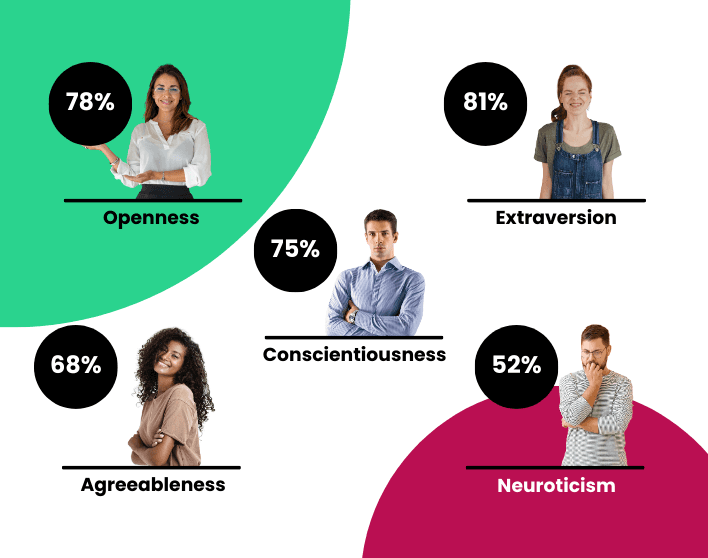The Bryq Team
HR Experts
There are big five personality traits that define how people respond to situations. In this article, we analyze the Big Five Personality Traits model and how it applies to the millennials generation.
Big Five Personality Traits background
The big five personality traits or Five Factor Model (FFM) was conceived in the late 50s and organizations started using it in the 90s (John M. Digman) to assess candidates. The application of the big five personality traits was an attempt to analyze the employee profile and bring clarity to personality traits and behaviors that were relevant to job performance.
What are the Big Five Personality Traits
The Five Factor Model is used by HR teams to assess candidates during the interview process. It allows exploring candidate personality in a professional environment.

Big Five personality Traits: Openness
Openness to experience is one of the five personality traits. Openness is considered a global personality trait and its main dimensions are imagination, aesthetic sensitivity, and curiosity (Weisberg, DeYoung and Hirsh, 2011). A low score in Openness means that you are not open to new experiences and a high score means that you enjoy new experiences. A high score in openness often relates to increased imagination and curiosity.
Big Five personality Traits: Conscientiousness
Conscientiousness is a personality factor that shows how seriousness and dedication translates to their work. Employees with high conscientiousness always put a lot of effort to get things done and they are very diligent. Scoring high for Conscientiousness is a success factor and it translates to perseverance, responsibility, and diligence. A low score in Conscientiousness in the personality test may indicate low attention to detail and inability to deliver timely on tasks. But there is a negative side to high Conscientiousness as an individual with high Conscientiousness might be a perfectionist and a workaholic.
Big Five personality Traits: Extroversion
The definition of Extroversion is being outgoing, talkative and sociable. Extroverts tend to work well in groups and they don't like to spend time alone. They also gain energy from being in social situations. An extrovert employee will be able to kick off conversations in the office and will find it easy to work with other teams. They will always be excited to meet new people and will create a social circle in the office. On the other hand, an introvert will prefer working alone and will find socializing with co-workers exhausting.
Big Five personality Traits: Agreeableness
The characteristics of an individual with high Agreeableness are sympathy, optimism, and friendliness. Harmony at work is important for individuals that score high in agreeableness. People who score high in this ability are perfect for building teams and creating an equilibrium at work as harmony at work is important for these individuals. Alas, people who score low on agreeableness will put their interests above those of other people.
Big Five personality Traits: Neuroticism
Neuroticism is a personality trait that shows how sensitive an individual is to anxiety, fear, anger, and loneliness. People that score high in Neuroticism tend to be more anxious and suffer from depressed moods. They might find it difficult to cope with a stressful but normal situation at work. Individuals that score low on Neuroticism tend to be more calm and stable and react better to stressful situations.
How does the Big Five personality Traits model fit with the current workforce
Millennials entered the workplace in the early 2000s and will comprise 75% of the global workforce by 2025 according to Deloitte. They have changed the workplace significantly since they entered the workforce and it's important to understand the common characteristics of their personality traits.
How millennials test for Openness
Millennials value new experiences and they are curious about new things. They appreciate learning opportunities and they like to work for companies that have a purpose.
Openness score: High
How millennials test for Conscientiousness
Millennials have proven to be very serious and dedicated to their work as long as their job has a meaning. They always put a lot of effort to get things done and take on responsibility.
Conscientiousness score: High
How millennials test for Extroversion
The majority of the millennials tend to be ambiverts which is a balance between an extrovert and an introvert. They enjoy spending time on their own and with others.
Extroversion score: Medium
How millennials test for Agreeableness
Millennials in the workplace are friendly and approachable. They value work-life balance and they want to work for companies that offer work flexibility. They are willing to compromise and not put their interests above others.
Agreeableness score: High
How millennials test for Neuroticism
Millennials are good at managing emotions and stress. They are even-tempered and can manage difficult situations in the workplace. Also, they are not afraid to change jobs if they feel that their company does not provide them with the right opportunities.
Neuroticism score: Low
If you are looking for deeper insights into how candidates match the personality requirements for a role, you should consider adding talent assessment in your hiring process. Look for platforms that have been designed to measure personality traits required for a specific job profile along with scientifically validated recommendations of the optimal traits to look for in a candidate.








